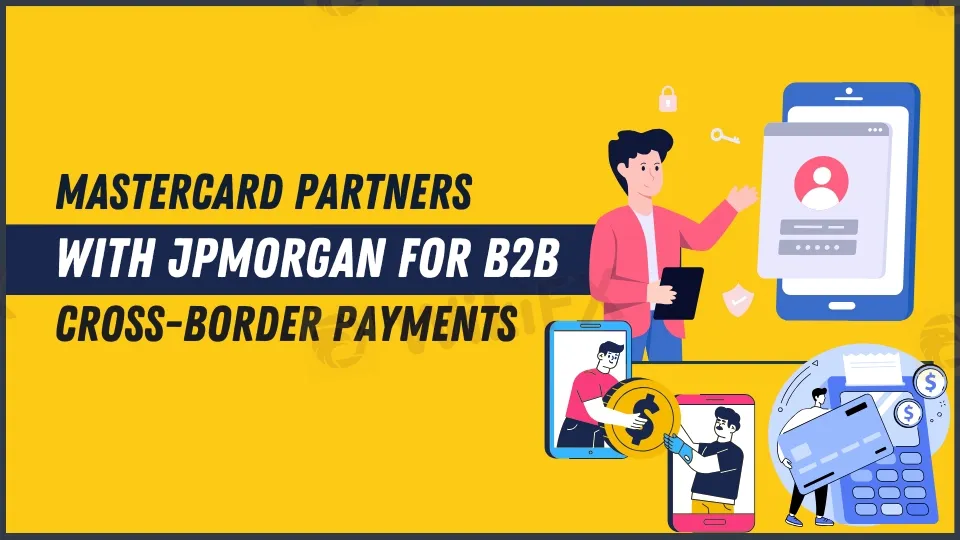简体中文
繁體中文
English
Pусский
日本語
ภาษาไทย
Tiếng Việt
Bahasa Indonesia
Español
हिन्दी
Filippiiniläinen
Français
Deutsch
Português
Türkçe
한국어
العربية
Mastercard Partners with JPMorgan for B2B Cross-Border Payments
Abstract:Mastercard and JPMorgan's Kinexys Digital Payments join forces to enhance B2B cross-border payments, promising faster settlements and greater transparency.

Mastercard has established a strategic relationship with JPMorgan's rebranded Kinexys Digital Payments, formerly known as JPM Coin, to improve B2B cross-border payments. This cooperation connects Mastercard's Multi-Token Network (MTN) to Kinexys' digital payment platform, improving the transfer of tokenized assets such as stablecoins and central bank digital currencies (CBDCs).
The primary goal of this collaboration is to speed up B2B transactions by increasing transparency, reducing settlement times, and removing time zone difficulties. The announcement, announced in a joint statement on Thursday, describes how these improvements would facilitate smoother cross-border transactions across global markets.
Mastercard's MTN, which debuted in mid-2023, was originally designed to evaluate the viability of tokenized bank deposits, stablecoins, and CBDCs in the payments ecosystem. MTN's integration with Kinexys will allow mutual clients to conduct B2B transactions via a single, unified API. This simplified approach intends to increase the speed and efficiency of international transactions, making global trade more accessible.

Raj Dhamodharan, EVP of Blockchain and Digital Assets at Mastercard, underlined the integration's potential, adding that it will enable speedier settlement capabilities for all players in the payment chain. This alliance comes at a time when JPMorgan is actively pushing the boundaries of digital asset use cases, as seen by the rebranding of its blockchain platform, Onyx, to Kinexys.
With this update, JPMorgan intends to integrate on-chain foreign exchange capabilities by the first quarter of 2025, cementing its position as a leader in automating near real-time, multi-currency clearing and settlement. This endeavor is part of a larger trend of tokenizing foreign exchange payments, which is being supported by programs such as the Monetary Authority of Singapore's Project Guardian, in which JPMorgan is heavily involved.
The collaboration between Mastercard and Kinexys represents a significant step forward in the evolution of cross-border payments, providing an innovative solution to long-standing issues in international commercial transactions. The companies are paving the path for a more efficient, secure, and transparent global payment infrastructure through the use of blockchain technology and tokenized assets.
Final Thoughts
As digital assets continue to disrupt the financial world, collaborations like the one between Mastercard and Kinexys are critical for fostering innovation. These companies are not only boosting the speed and efficiency of B2B cross-border payments; they are also laying the framework for the future of global commerce.

Disclaimer:
The views in this article only represent the author's personal views, and do not constitute investment advice on this platform. This platform does not guarantee the accuracy, completeness and timeliness of the information in the article, and will not be liable for any loss caused by the use of or reliance on the information in the article.
Read more

Kraken Offers $105 Fee Credit for FTX Fund Recipients
Kraken offers $105 in trading fee credits to FTX fund recipients, enabling $50,000 in crypto trading on Kraken Pro with zero fees. Secure your funds today!

Good News Malaysia: Ready for 5% GDP Growth in 2025!
Malaysia's economy is on track to sustain its robust growth, with GDP expected to exceed 5% in 2025, according to key government officials. The nation's economic resilience is being driven by strong foreign investments and targeted government initiatives designed to mitigate global economic risks.

Oriental Kopi’s IPO: Worth the Buzz or Not?
Kopi Holdings Bhd, a café chain operator under the brand Oriental Kopi, is gearing up for its listing on the ACE Market of Bursa Malaysia. The company has garnered a positive valuation from Mercury Securities Sdn Bhd, which has assigned a fair value of 68 sen per share, citing strong earnings growth potential driven by outlet expansions and increasing contributions from fast-moving consumer goods (FMCG) sales.

Tradu Introduces Tax-Efficient Spread Betting for UK Traders
Tradu’s introduction of tax-efficient spread betting and groundbreaking tools like the Spread Tracker signals a new era of accessible, competitive, and innovative trading solutions for UK investors.
WikiFX Broker
Latest News
BI Apprehends Japanese Scam Leader in Manila
Bitcoin in 2025: The Opportunities and Challenges Ahead
Join the Event & Level Up Your Forex Journey
Is There Still Opportunity as Gold Reaches 4-Week High?
Bitcoin miner\s claim to recover £600m in Newport tip thrown out
Good News Malaysia: Ready for 5% GDP Growth in 2025!
How to Automate Forex and Crypto Trading for Better Profits
Breaking News! Federal Reserve Slows Down Interest Rate Cuts
Beware: Pig Butchering Scam Targeting Vulnerable Individuals
This Economic Indicator Sparks Speculation of a Japan Rate Hike!
Currency Calculator






